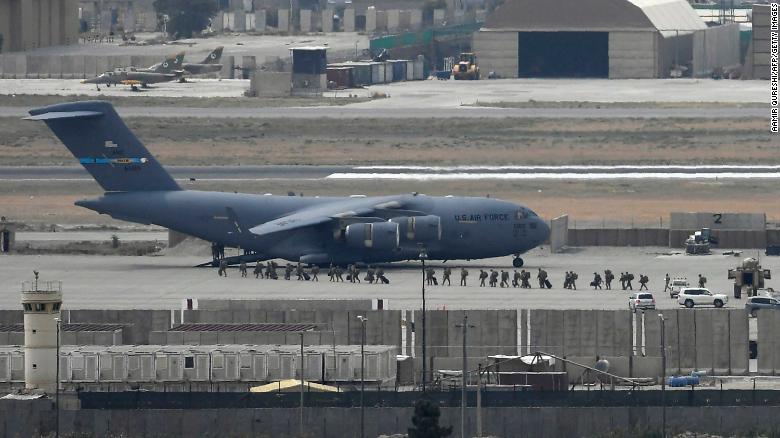9/11 anniversary: Afghanistan worries the West again 3:44
Kabul, Afghanistan (CNN) -
Commander Supranullah was busy pulling us out of the monsoon rain to take refuge on his front porch.
The porch is both his office and his bedroom, which is convenient because since he became the Taliban's point of reference for solving problems and authorizing journalists visiting the Pakistani border, Supranullah - who, like many Afghans in rural areas - just use one name - have come under fire.
He has a five-kilometer line of heavily loaded trucks waiting to leave Afghanistan at the Torkham border crossing.
Afghanistan is now one of the few countries without women in senior government positions
When we entered his world, he was scribbling in a notebook the details transmitted to him by an armed subordinate.
Dressed in camouflage suit, the commander was barefoot despite the rain, working at a low table and sitting on his kot, the traditional sofa bed.
"Who do you know in Kabul?" He asked.
"To Zabihullah Mujahid," we replied, naming the Taliban spokesperson.
A young armed Taliban joked: "That is the correct answer."
Thus began our surreal and sometimes fearful odyssey from the Khyber Pass in Pakistan to Kabul.
The last US military planes left Kabul airport just before the August 31 deadline, which marks the total withdrawal of US forces.
In the 1990s, when I covered the Taliban's war for control of the country, I was amazed at the amount of old Soviet military equipment left behind during their withdrawal in 1989. It was a strange
déjà vu to
see the white flags of the Taliban now flying from fallen sandbags and ramshackle Hesco barriers that not long ago lined the perimeter of America's Afghan empire.
We passed crumbling border posts, the sprawling Jalalabad airstrip, and several old American bases.
I had flown Black Hawk helicopter missions in and out of some of these bases, and had even seen an Afghan drone take off at Jalalabad.
Now, looking at the abandoned cabins and communications towers, it was as if he had stepped back in time before the al Qaeda attacks of September 11, 2001, which spawned the war the United States has been waging here for decades.
advertising
Qatar Airways second passenger flight takes off from Kabul
The fight against the Americans is still fresh in the minds of many members of the Taliban, but even after the victory, some like Commander Supranullah and his men seemed willing to get back in the game, albeit with an underlying mistrust.
He fled Afghanistan and returned as a soldier after 9/11 4:38
The Kabul Highway
The billions of dollars spent here are visible on the roads.
Compared to before the arrival of US forces in late 2001, the 230-kilometer drive from the border to Kabul should have been a walk: smooth asphalt at all times.
Without obstacles, the journey could have taken five hours.
These roads were packed with people as we drove to Kabul, huge trucks trudging up the dizzying mountain passes, young people at the wheel zigzagging dangerously in and out of crowded lanes, minivans and taxis crammed with young families on board, taking their time with caution.
None of them were rushing toward the border.
Compared to yesteryear, this is a country that continues to have a chaotic charm despite the economic uncertainty it faces.
We walked through bazaars listening to vendors trying to outdo each other, selling freshly roasted corn, fried fish, sweets, grapes, pomegranates, and delicious long hot naan fresh from the ovens.
What was absent amid the hubbub were the women.
The Taliban have warned them to stay home, and many seem to have heeded them.
Only in really rural places were women seen, and even then only a few and in groups.
Taliban beat women and journalists with sticks and whips at a protest in Kabul
A group of half a dozen women in brightly colored shawls carried yellowish corn stalks on their heads as they walked down the road.
Another small group of women were covered in abayas, black robes that hide their bodies, and only ventured out in groups to protect themselves.
UN asks the Taliban to respect the demonstrations 0:48
Without having a chance to stop and talk to them, in our effort to get to Kabul before dark, it is difficult to know what they think of the Taliban regime. It is equally imponderable to what extent regime change is changing life in remote and culturally conservative communities. But what is certain is that the gains in rights and freedoms that occurred under the Western-backed government have disappeared for now.
The Taliban's grip on security is firm.
As we passed through a busy market in a small town, an armed man came out of the crowd forcibly stopped us.
He demanded to know who we were, what we were doing, and where we were going.
We explained to him, as we had done to Commander Supranullah, that we had permission from the Taliban to travel, and we showed him the documents they were going to give us.
UN calls on Taliban to "immediately cease" use of force against protesters and journalists
It was not enough.
In a matter of minutes, they got us out of there, he said, for further questioning.
As they sped us out of town, it seemed less clear who they were and where they were taking us.
The matter was resolved fairly quickly by calls to the Taliban headquarters in Kabul.
But what is clear is that, weeks after the militants took power, the security situation under the Taliban remains highly fluid.
Our few minutes wondering what would happen next were insignificant next to the fear that many Afghans live with on a daily basis.
Just because we couldn't see it on our trip doesn't mean it's not happening.
-
CNN's Ingrid Formanek contributed to this report.
Taliban

